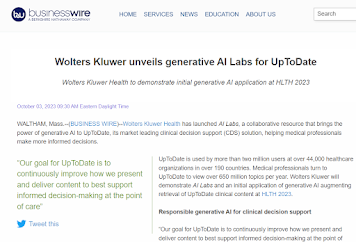This past week, I saw a press release that UPTODATE (Wolters Kluwer) would soon incorporate AI-based functions for clinicians who use it. UPTODATE, which costs several hundred dollars per year, is a rapidly updated online encylopedia of diseases, diagnostic pathways, and treatments. (It's a bit like the "Merck Manual" of the 20th century). The press release pointed to a demo at a health conference, HLTH 2023.
I think that adding AI to UpTodate is pending future function. But, I noticed that UpToDate already has a chapter with a very long listing of dozens and dozens of devies that already incorporate machine learning or AI, classed by disorder (neurology, cardiology, etc.)
- In this blog, I'll give a summary of the press release.
- I can't give the copyrighted chapter about ML devices, but I will provide the UpToDate page link (for readers who are subscribers) and a summary of that online chapter.
PART ONE - PRESS RELEASE
Summary of Press Release
Wolters Kluwer Health has introduced AI Labs, a collaborative initiative aimed at enhancing its clinical decision support (CDS) solution, UpToDate, with generative AI capabilities.
UpToDate, used by over two million healthcare professionals across 190 countries, provides access to more than 12,400 clinical topics.
Wolters Kluwer aims to improve the presentation and delivery of content in UpToDate to support better decision-making at the point of care. The company plans to showcase AI Labs and an initial generative AI application at HLTH 2023, demonstrating how this technology can augment the retrieval of clinical content. The responsible application of generative AI is a top priority, and Wolters Kluwer aims to collaborate with UpToDate users to enhance clinical decision-making while maintaining safety and effectiveness.
Approximately 50% of Wolters Kluwer's digital revenues now come from AI-based products, aligning with the company's commitment to trust, transparency, and responsible AI development.
PART TWO - SUMMARY OF CURRENT ML/AI PAGES
The newly added chapter in UpToDate, dedicated to Medical Devices Enabled by Artificial Intelligence (AI) and Machine Learning (ML), offers clinicians a comprehensive resource encompassing a wide spectrum of clinical conditions and a diverse array of AI-powered devices. The chapter lists dozens of devices, by clinical category (such as "Neurology.") It serves as an informative guide to the expanding landscape of AI and ML technologies in healthcare.
Across various medical specialties, the chapter provides insights into the new integration of AI and ML in clinical practice. Clinicians can explore how these technologies are transforming patient care and decision-making in fields such as cardiology, endocrinology, gastroenterology, genetics, nephrology, neurology, obstetrics and gynecology, ophthalmology, pediatrics, pulmonology, sleep medicine, surgery, and more.
This chapter acknowledges the ever-increasing number of AI and ML devices that have gained regulatory approval from the US Food and Drug Administration (FDA). These devices are designed to enhance healthcare delivery, improve diagnostic accuracy, and streamline treatment strategies. As the healthcare landscape continues to evolve, AI and ML are becoming integral tools for clinicians, offering valuable insights, automated analyses, and data-driven recommendations.
Clinicians can explore the diverse applications of AI and ML across a broad range of clinical conditions, including:
cardiac arrhythmias, diabetes management, colonic polyps detection, genetic risk assessment, kidney function assessment, traumatic brain injury diagnosis, seizure monitoring, retinal disorders, autism spectrum disorder assessment, sleep disorder diagnosis, wound assessment, laparoscopic surgery, blood loss estimation, intraoperative monitoring, and stereotactic image guidance.
While the chapter refrains from endorsing specific devices, it highlights the significance of these AI and ML technologies in addressing the complex healthcare challenges of the modern era. The variety of clinical conditions covered underscores the versatility of AI-powered devices in assisting clinicians in different specialties.
In conclusion, the UpToDate chapter on AI and ML-enabled medical devices provides clinicians with a valuable reference that reflects the growing influence of these technologies in healthcare. With applications spanning numerous clinical conditions and specialties, this chapter serves as a testament to the transformative potential of AI and ML in improving patient outcomes and the practice of medicine. As the field of AI in healthcare continues to evolve, UpToDate ensures that clinicians remain informed about the latest developments and innovations in this dynamic and rapidly advancing domain.
##
AI Corner
Above, the press release is shortened via an AI summary.
The descripton of the AI chapter is by AI with my edits (original 8000 words, 27pp). This UpToDate chapter on AI-ML has 150 references.
Sample UpToDate AI/ML Product Description:
HeartFlow is one of the better-known devices in the AI-ML field; this is the UpToDate entry for HeartFlow:
● HeartFlow FFRCT Analysis – HeartFlow Analysis is simulation software that analyzes separately-acquired CT DICOM data for symptomatic but clinically stable patients with CAD [56-58,82]. FFRCT analysis assess coronary artery anatomy and function, thereby supporting the evaluation of CAD. There is also a version 2.0 [83].
